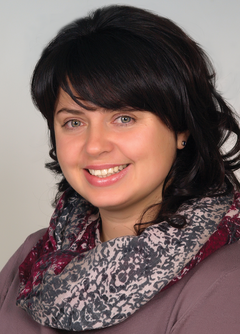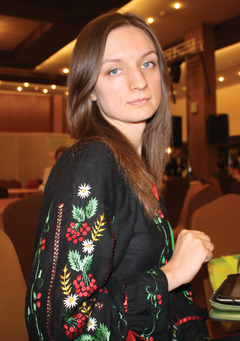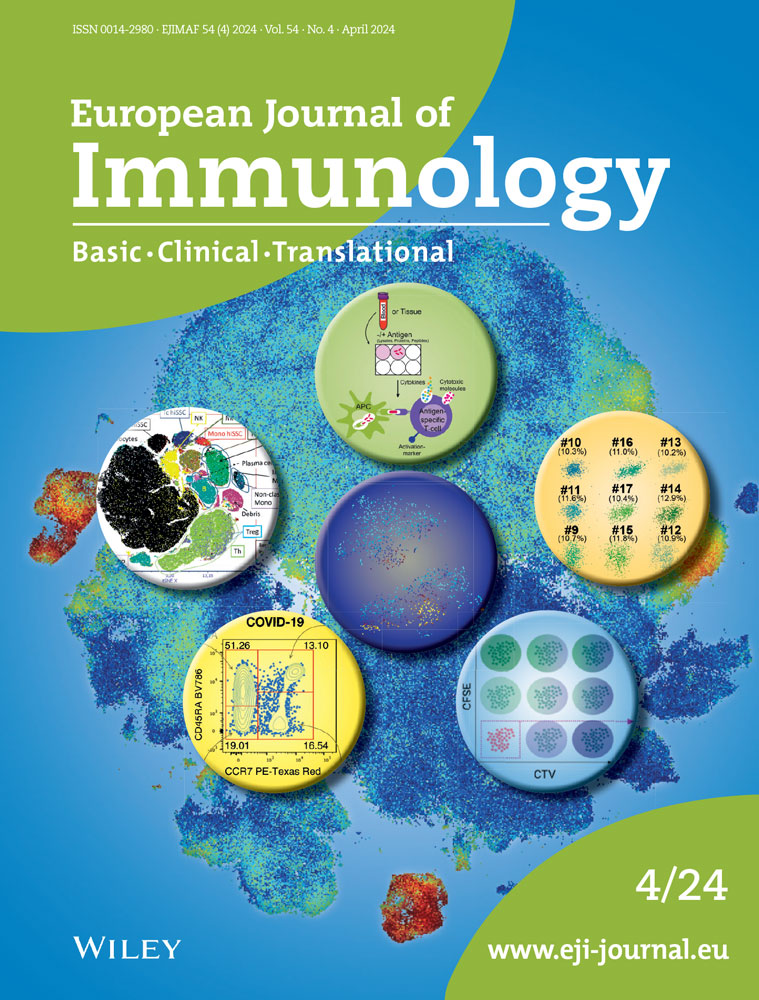EFIS Ukraine Mobility Initiative
In May 2022 EFIS launched a special mobility scheme to assist Ukrainian students and early career researchers active in immunology and related fields who currently are unable to work as they are forced to flee the ongoing conflict or are already abroad and cannot return home. Specifically, EFIS will finance dedicated fellowships to early career Ukrainian scientists with up to six months of support to undertake stays abroad in order to pursue their research or training in European host laboratories and institutions. EJI had the opportunity to talk with the two fellowship awardees and discussed how this prize helped them to achieve milestones in their academic lives.
Q&A with Tetiana Kotelevska

How would you describe the significance of this internship to your professional growth and aspirations?
The EFIS initiative of support and solidarity with Ukraine and Ukrainian scientists is a significant event in my life. This is a unique opportunity to undergo an internship at one of the leading European centers for immunological research. The acquired knowledge and experience has opened up new areas of scientific research and helped me with new ideas for further scientific projects in my specialty. I would like to take this opportunity to thank the EFIS Federation for this initiative as well as their absolute support of Ukrainian science and my research.
Could you please elaborate on the specific skills or knowledge you have acquired throughout your internship?
During my fellowship, I had the opportunity to continue research in the field of infectious immunology. Based on previous experience, the main focus of my work was studying the connection between the microbiota and the immune system. What made this experience particularly enriching was the opportunity to acquire new research methodologies and enhancing my proficiency in handling state-of-the-art equipment. I learned new methods of research and mastered the skills of working with modern equipment, in particular, an immunofluorescence microscope, a cytofluorescence sorter, a cytometer, and other facilities.
The acquired skills helped me delve deeper into the scientific questions that link infections and autoimmunity. In the course of my work, I participated in a clinical study that addressed the impact of COVID-19 vaccination on the composition of the microbiota. I gained theoretical knowledge and practical experience and have started to study the microbiota-antibody interactions in the course of vaccination against SARS-CoV-2.
The knowledge and expertise I acquired during this period have far-reaching implications, not only for my own career but also for the broader scientific community. By enhancing our understanding of the microbiota and the immune system interplay during infectious and autoimmune processes, we open the doors to more effective disease prevention and treatment strategies that can benefit society at large.
In what ways do you plan to utilize the knowledge and experience gained during your internship to contribute to your current work focus?
Acquiring knowledge and experience in the field of microbiota and its connection to infectious pathogens is of paramount importance in today's scientific landscape. The expertise gained through dedicated study forms a solid foundation for the development of innovative scientific projects and ideas. As we move forward in our quest to combat infectious diseases, such knowledge becomes increasingly crucial.
In the context of Ukraine, this knowledge takes on added significance due to the prevalence of socially significant parasitic infections, including opisthorchosis and giardiasis, as well as the serious public health concerns of HIV infection, tuberculosis, and viral hepatitis B and C. Understanding the intricate relationship between microbiota and the immune system is a promising avenue of research. It not only aids in revealing the complexities of these infections but also holds the potential to
revolutionize their diagnosis and treatment. The insights gained from this research can lead to more effective interventions, reducing the burden of these diseases on individuals and society as a whole.
Furthermore, by delving into the nexus of microbiota and autoimmunity in the context of these infections, researchers can uncover novel therapeutic approaches. This multidisciplinary approach not only enriches the scientific community but also offers hope for improved healthcare outcomes and the eventual control of these infectious diseases. The synergy between acquired knowledge, practical experience, and a dedication to addressing pressing healthcare issues underscores the indispensable role that continuous learning and research play in advancing the field and improving the well-being of populations. Therefore, I plan to continue studying the connection between microbiota and the current infectious pathogens.
From your perspective, what are the key differences you have observed in research practices between Germany and Ukraine?
The vectors of scientific research in the research practices of Germany and Ukraine are quite similar. The exchange of ideas and experience promotes movement in the same direction and forms a common vision of unresolved global scientific issues. International research cooperation plays a pivotal role in advancing scientific endeavors and fostering innovation. This collaborative effort not only facilitates progress but also nurtures a shared perspective on addressing pressing global scientific challenges. Through cross-border collaborations, researchers from both countries can pool their expertise and resources to tackle complex issues, bringing us closer to innovative solutions that benefit humanity.
At the same time, the financing of Ukrainian science and the support of Ukrainian scientific initiatives and projects remain challenging issues that require attention and action. It is therefore essential to address this critical concern in Ukraine's scientific landscape. Adequate financial support is the lifeblood of scientific progress, enabling researchers to conduct experiments, acquire equipment, and dedicate time to critical investigations. By strengthening the scientific infrastructure and funding, we can empower Ukrainian researchers to make even greater strides in addressing global challenges and further solidify international research cooperation as a cornerstone of scientific advancement.
Q&A with Mariia Rudyk

How would you describe the significance of this internship to your professional growth and aspirations?
Thanks to the Ukraine Mobility Initiative, I had a unique opportunity to work at Prof. Dirk Busch laboratory, Institute for Medical Microbiology, Immunology and Hygiene, Technische Universität München, Germany with the leading specialists in the immunology field. In my professional activity, I mainly use flow cytometry analysis in experimental scientific work. But due to scarce experience and absence of instruments that are generally expensive, I did not have much hope to get any real knowledge and practical skills of flow cytometry in my university. In Prof. Busch laboratory, I had access to the best flow cytometry instruments and worked by myself with biology materials relevant to my research interest under the guidance of high professional scientists. Their valuable advices helped me to grow professionally and I believe that this experience will allow me to perform my research on the highest level.
Could you please elaborate on the specific skills or knowledge you have acquired throughout your internship?
Our scientific group is focused on the studies of functional polarization of phagocytic cells, such as macrophages and granulocytes, and their importance in development of inflammatory disorders (neurodegenerative diseases such as Alzheimer and Parkinson's diseases, necrotic pancreatitis, obesity). Flow cytometry is an important method for evaluation of not only phenotypic marker expression but also functional and metabolic activity of these cells (for example phagocytosis and ROS production). It is essential for me that I can perform all of the stages of this analysis from the sample preparation to the image characterization on the flow cytometer. No less valuable were the practical skills in cell culturing and PCR technique. I also had exceptional prospect to study chip cytometry of tissue samples which is the most novel method operated in Prof. Busch laboratory, one of the few laboratories in Europe where this technique is developed.
In what ways do you plan to utilize the knowledge and experience gained during your internship to contribute to your current work focus?
Moreover, since I combine scientific activity with teaching in my University, I can share gained knowledge with my students. Flow cytometry is one of the broadly used techniques in immunology and cell biology, and students graduated from our Department of Microbiology and Immunology often had to work with this method at work. I am proud to say that, after half a year spend in Munich University, I can inspire them to study this technique to use it in future professional activity. In addition, now, when I am staying in touch with my German colleagues, we can plan future collaborations for scientific investigation and student exchanges to share our experience.
From your perspective, what are the key differences you have observed in research practices between Germany and Ukraine?
I am deeply thankful to the EFIS and personally Prof. Dirk Bush for all the support and great opportunity of working in his laboratory. It is especially important for me in such hard times of the war in Ukraine. There are no principal differences in research practices in Germany and Ukraine. Though the situation in science here in Ukraine is extremely complicated nowadays taking into account electricity and heating problems, personal unsafety and uncertainty about the future, and despite the international assistance we work in circumstances of cutting off financial support for our investigations. One of the biggest problems is that young researchers, who were forced to leave the country due to the Russian invasion, gradually lose their professional skills and this creates a shortage of scientific personnel in our country. The Ukraine Mobility Initiative is one of the most effective mobility programs for them to provide not only their safety, but also continuation of studies and professional growth.




